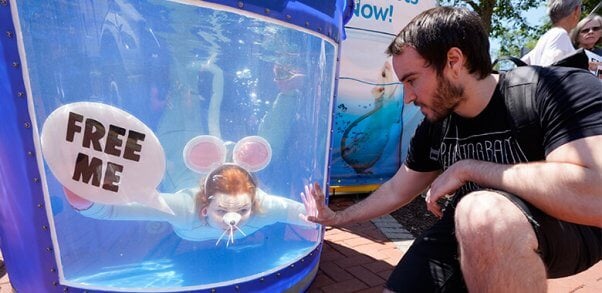Bristol-Myers Squibb Shareholder, PETA Take on Big Pharma in Boardroom
Together with a Bristol-Myers Squibb shareholder, PETA—which also owns stock in the company—has submitted a joint shareholder resolution calling on the company to assess the effectiveness of and report to shareholders on the forced swim test, in which mice, rats, guinea pigs, hamsters, and gerbils are dropped into beakers filled with water and forced to swim to keep from drowning. It’s used as a supposed model for depression.
“Bristol-Myers Squibb has forced more than 1,000 frantic animals to swim for their lives in a test that hasn’t yielded even one treatment for human depression,” notes PETA neuroscientist Dr. Emily Trunnell. “The company has an ethical and scientific obligation to delve into this test and explain its actions to its shareholders.”

Bristol-Myers Squibb claims not to be conducting the test “currently,” but in the past 11 years, the company has subjected at least 748 gerbils, 698 mice, and 192 rats to it. Animals used in these tests frantically try to escape and paddle furiously, desperately trying to keep their heads above water. Eventually, most start to float—which scientific data (and common sense) show is more likely a learned and adaptive behavior that saves energy, is beneficial for survival, and is unrelated to depression, despite experimenters’ claims to the contrary. PETA scientists reviewed published studies and found that dropping animals into water in this way is less accurate than a coin toss in determining a drug’s effectiveness in humans.
Pfizer, Johnson & Johnson, AbbVie, AstraZeneca, Novo Nordisk A/S, Sage Therapeutics, Boehringer Ingelheim, and Bayer all banned the test after talks with PETA. Let’s win more victories: Tell pharma giants Bristol-Myers Squibb and Eli Lilly to end the forced swim test today.

